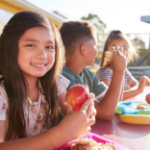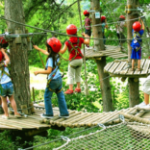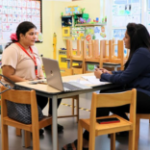
The start of kindergarten is a great and life-changing experience both for children and their parents. Kindergarten is a significant transition point, which requires proper preparation. But preparation of a child for kindergarten is more than academic preparedness-it is an emotional, social, physical, and cognitive preparation. It’s a holistic approach, and a child will be all set to succeed in his or her new educational setting. In this blog, we will explore how parents and educators can work together to prepare children for this very important next step in their academic journey.
Emotional Readiness
Of the most important preparations for kindergarten is emotional readiness. Children need to develop the ability to manage their emotions, especially separation anxiety. While it is inevitable that children will feel anxious and fearful about leaving home, mastery of emotional regulation skills is a precondition for success in the classroom. These can be fostered at home by encouraging independence, allowing children to make simple decisions, and teaching them some strategies for coping with frustrating or sad feelings. Creating positive associations with school and celebrating transitions can also ease the emotional weight.
In addition, an important aspect is generating self-confidence and resilience. With such security in their abilities, they would approach challenges with a whole-heartedly positive attitude. Activities involving letting them try out doing things on their own to accomplish small tasks and praising them for their effort will assist them in building this self-confidence.
Social Readiness
Social skills are a must for success in kindergarten. Children need to be able to interact with their peers, share, take turns, and express feelings appropriately. Social readiness involves teaching children how to communicate effectively with others and work cooperatively in group settings. Playdates, group activities, and time spent in social settings can help children develop such critical skills.
Teaching the children to be empathetic also falls under social development. Support a child in understanding other’s emotions; do this through role plays or through reading books on how individuals react towards their emotions. It becomes more simple for children to have social relations and even to gain more friends if they are more able to empathize with their playmates.
Cognitive and Academic Readiness
Kindergarten is not strictly an academic experience, but preparation for the learning environment is essential. Basic cognitive skills, such as letter recognition, number recognition, shape recognition, and color recognition, form the foundation for later learning. Parents can support academic readiness by playing games like reading books, singing alphabet songs, and practicing basic counting games. These activities create a love for learning and help build the skills necessary for more formal instruction.
Other cognitive skills that foster students’ acumen include problem-solving and critical thinking. Engage a child in activities that challenge the brain, such as puzzles, memory games, or simple science experiments. These exercises promote curiosity and logical thinking, preparing children for the problem-solving tasks they will encounter in kindergarten.
Physical Readiness
Another important aspect of preparation for kindergarten is physical development. Children should be able to independently handle self-care tasks such as dressing, eating, and using the bathroom. These skills are essential for their growth and confidence in a classroom setting. Such skills are required for easy movement around the classroom and comfortable participation in any activity.
Fine motor skills, like cutting with scissors, drawing, and writing, are also important at this stage. Activities such as coloring, drawing, or building with blocks help children refine their fine motor abilities, which will be used in tasks like writing and cutting.
Gross motor skills like running, jumping, and climbing are essential for a child’s physical development, helping to build coordination, balance, and strength are just as important. Outdoor play, games, and activities such as dancing or playing catch promote coordination and physical fitness. Such skills will make children feel comfortable with the physical activities that they are engaged in and make them more healthy.
Establishing Routines
Another important aspect in preparing for kindergarten is to establish consistent routines at home. Children thrive on predictability, and a consistent daily schedule can give them a sense of security, preparing them for the classroom structure. This includes regular sleep patterns, healthy eating habits, and a balanced routine of work and play.
A structured routine provides children with the tools they need to transition smoothly into the kindergarten environment, where they will be expected to follow schedules and routines for various activities such as snack time, learning sessions, and outdoor play.
Role of Parents and Educators
Both parents and teachers prepare children for kindergarten. The parents do this in their homes, and some ways to foster preparation include independence, responsibility, and curiosity. Spending time with your child through educational activities, reading, and providing opportunities to socialize can better prepare them for a successful experience in kindergarten.
Whereas the teachers prepare the very learning environment that will allow such skills to flourish further. Classrooms of the teachers are devoted more towards socializing children and getting academic concepts to them through enjoyable means and a protective structured setting in which every child can feel secure. This means both parents and teachers work closely for a child to do well in the initial year and have a smooth integration into kindergarten.
Summary
Preparing children for kindergarten requires a holistic approach that incorporates emotional, social, cognitive, and physical readiness. By fostering emotional regulation, social skills, basic academic knowledge, and physical independence, parents and educators can help children make a smooth and successful transition to kindergarten. In our attempt at Tiny Tots English School, Pimpri-Chinchwad, Pune, we embrace this holistic approach ensuring that every child is geared up to face the challenge and excitement of starting school with open arms. With a collaborative effort in such an environment, we can guide the children on the path of lifelong learning and success.




